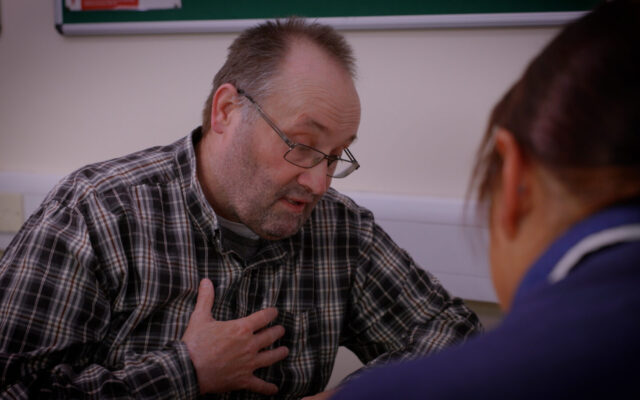Andrew Holman has been contributing his pithy and trenchant articles for more years than I can remember. This is his last regular article. His contributions will be greatly missed. I hope we shall still get the occasional offering when his frustration with our less than perfect services forces him to put pen to paper. We wish him well in his ‘writing retirement’.
Elinor Harbridge, Editor
Policy
Review of the year
2014: a year of ups and downs but mainly downs
In his last article for Community Living, Andrew Holman reflects on the events of 2014 and expresses his sadness at how some services seem to be going backwards
After 25 years I’ve decided it is time to retire from writing and thought a roundup of the happenings of 2014, from what people I know have told me, would be as good a way to bow out as any. Unfortunately it makes for mostly dismal reading sprinkled with some good news.
The year 2014 was always going to be another difficult one for many – after some eight years of cuts imposed on and by local authorities things were never going to be easy. It is extremely sad to see many services going backwards, although I’ve seen less of the hypocrisy of everyone saying how they are going to provide ‘world class services’ despite the daily evidence otherwise!
Several people I know – among thousands of others – have had their services cut. They got some token ‘signposting’ to other organisations that might help but in practice it didn’t meet people’s needs. I’ve seen a rise in IQ testing to ‘ascertain’ if someone has a learning disability or not – if they have they then go forward to the next stage of being ‘considered’ for a service against another set of criteria, or barriers as I prefer to call them. That is a pity when I thought we had developed a more sophisticated assessment system based on what people needed, as opposed to a score.
Other people have had more stringent assessments of what they need. A sneaky way of saving money is to have the assessment strung out over many weeks, to see how you’re failing over the long term whilst still not providing any support. Unfortunately, the quality of some of those assessments left a little to be desired; usually being carried out by minimally trained non-professional staff. I questioned one who had decided to cut short an assessment to make extremely worrying allegations about him ‘ogling her cleavage’. The assessor seemed to have forgotten her client was almost totally blind and would have had trouble seeing any detail of her bust at any distance with or without squinting! It also raised a question about what is or isn’t appropriate clothing to wear to work (discuss!). It left the couple in a quandary as to whether to complain or not, fearing they would lose their service, but also worried about the damage such an action might have and what would be put on his file.
The cuts to support have caused people problems but it appears many of those affected have gone on to use other services, primarily GPs and mental health services.
The other area where people end up is the justice system. No one I know has experience of this but the figures tell us it is happening. On a positive note, there are plans to have 13 trial schemes with mental health teams based at police stations and courts. The blurb states they ‘aim to ensure people who come into the criminal justice system with mental health conditions, learning disabilities and other vulnerabilities are recognised and are promptly referred into health and other services to get the treatment or support they need’. We have also seen a rise in the amount of EasyRead information for people in the justice system, most of which has been of really good quality, not just ours at Inspired!
On that brighter note, the people with learning disabilities we employ here still have jobs. I can’t pretend is hasn’t been tough and, given the choice, many of our customers would opt for a cheaper service than pay for co-production, but we muddle through and continue to produce a stream of EasyRead information, last year producing over 250 pieces for over 50 organisations.
Others are doing admirable work; for example, the continued progress of the Stay Up Late campaign and their offshoot Gig buddies. It focuses on friendships and fun, the stuff of life denied to many, and I thoroughly enjoy catching up every time I meet these wonderfully positive people.
But to return to problem issues, it remains a great pity that the death certificate system has still not been overhauled since the Shipman investigation all those years ago. The changes, if implemented, could offer a far better picture of the early and sometimes unwarranted deaths of people with learning disabilities that we still saw happening in 2014.
Another still neglected area is the commissioning of services like Winterbourne View. This scandal continued to spread shock waves throughout the year with promises to close such institutions – with the result that more people were sent to them than left! To say this remains an absolute (insert your favourite swear word here) blot on our abilities to serve people with higher support needs should not need to be stated. I’m sure lots of good work is being done with some people to get them a more appropriate person-centred service but without sorting the fundamental issues of changing the people who buy these services and developing appropriate local support systems, it is doomed to failure. And every year we have a new report produced at great cost saying the same thing…
Many people think pushing an issue up to government level will bring about change but it can also end up stagnating in a bureaucratic quagmire with official reports on the matter seemingly written to obfuscate rather than progress matters.
On the brighter side, one of the very last long stay institutions, Calderstones in Lancashire (motto ‘changing lives through excellence’) is being closed following disastrous inspection reports during the year. Well, they say it is!
Another piece of good news that surprised me is that health checks for people with learning disabilities have continued. I hadn’t heard people talking about them much but when I checked they were being done and seem to have become routine.
It’s also been good to see the rise in preventative health information. Inspired have done a lot, including a whole series of EasyRead cancer leaflets, the blood in pee or poo ones as well as out-of-breath, heartburn, and so on. What worries me is their availability – they don’t seem to be everywhere despite the national campaigns in which they featured.
What remains a pity is the lack of a national perspective on EasyRead. We see lots of money spent on local information that doesn’t get much further, resulting in several different versions of a leaflet, all to different standards, while other subjects go uncovered. This happened when we were commissioned to do something on cervical smears. We found several copies already out there. We changed tack, went out and asked women what would be useful and are now producing something that we hope helps people get over some of the difficulties they face in having a smear, addressing professional, parent and carer attitudes as well as fears of their own. We hope this may help to increase the pitifully low number of women with learning disabilities – only 20 per cent – having a smear.
All this information is of course a major part of prevention, encouraging and supporting us all to do what we can to keep well. This is the way of the future, yet EasyRead reports we have done for some areas of the country clearly show problems; for example, figures for obesity in people with learning disabilities are rising more than the general population. Unfortunately, this is certainly true for lots of people I see and, one suspects, lower levels of support are contributing to this increase. It is a complex issue with many factors that, if left unaddressed, can have tragic consequences.
Inspired produced a series of booklets and short animated videos for the Department of Health on people’s rights and responsibilities to health services, based on the updated NHS constitution. These included things people should try to do more about. The group of people with learning disabilities working on them had high hopes of seeing the results shown in waiting rooms everywhere – no such luck yet but fingers are still crossed!
It was good to hear people still talking positively about local learning disability nurses. The future of the profession is always muttered about, and indeed I was one of those mutterers in the past, but with the demise of other support they are still in great demand and kept there with various registration requirements. I also continue to see community workers known by service users to be reliable and available – that is, in the areas that have them.
During the year, I heard from many people I’ve met through work over the past 25 years. A few have been using direct payments since we managed to get people with learning disabilities included in the original law. Many readers will remember that the government was going to exclude people with learning disabilities but we ran a strong campaign based on my first Funding Freedom book in 1996 and managed to convince them that exclusion wasn’t a good idea.
One of the issues I warned about with direct payments was the possibility of financial abuse. Without proper support to help manage them I knew many would be vulnerable. Unfortunately, this has proved to be true with several people reporting abuse. It has also meant managing with a much reduced service for ages until it is sorted out.
Similar issues were identified in a recent study by the National Institute of Health Research, School for Social Care Research*. It reported that “there was a statistically significant higher proportion of (safeguarding) referrals for financial abuse and abuse by home care workers”. They also found users “reported a lack of information about managing risk and funding options, plus insufficient support for being an employer”. So, sadly, no surprises there then.
On a lighter note, based on that early direct payments work, one man moved out of a long stay hospital up north into his own flat. He still has the same support worker he employed 16 years ago! I remember talking to him at the time about the benefit of having a shared interest with your support. They both love plane spotting and quickly ended up sharing social time together. Now, as a long-time friend, it was especially heartening to hear from him at Christmas about them sharing Boxing Day together once again.
Someone else on the move was the daughter of a good friend who moved into her own shared bungalow at the end of the year – I wish her the very best for the future. However, it needed exceptionally strong and determined advocacy from a knowledgeable mother to get her there and, even with that, her daughter still didn’t have a choice in where she lived, who she lived with, or who provided the support.
What about 2015? We have an election approaching with the parties trying to outdo each other over how much they can cut from public services. It does not bode well. There is an attention on retaining the level of older people’s benefits and that, despite my age and paucity of pension, I believe unwarranted. There has to be more means-testing to help pay for services to the people who need them most, whatever their age.
I hope that good sense will prevail and it will be seen that cutting services does not save anything in the long term – but I doubt it. Costs will pop up elsewhere causing immeasurable damage to the people concerned along the way.
In the meantime, we are starting to see the rise of stronger campaigning – a neglected activity following the demise of Values Into Action. I strongly support the values and activities of the Learning Disability Alliance England and wish them every success in the run up to the election.
- Risk, Safeguarding and Personal Budgets: exploring relationships and identifying good practice Stevens, M., Aspinal, F., Woolham, J., Manthorpe, J., Hussein, S., Samsi, K., Baxter, K., Ismail, M. 2014, Research Findings, RF41, NIHR School For Social Care Research, London.
NB. This summer I will be posting articles and other bits and bobs I’ve written over those years on a website www.andrewholman.me.uk.




